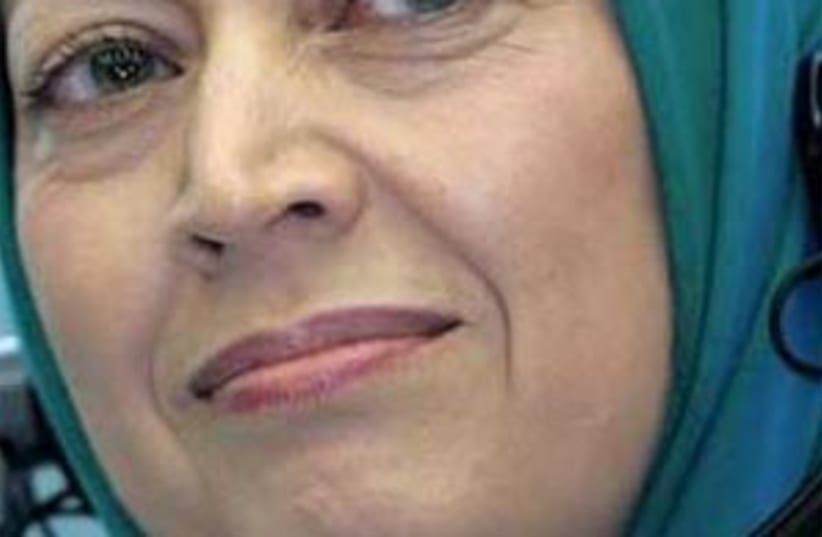The MKO was established in the 1960s, based on an ideological mix of Marxism and Islam, and grew in membership during the years prior to the overthrow of the shah.
The MKO formed an alliance with the Grand Ayatollah Khomeini prior to the Islamic revolution of 1979. Its fighters and supporters took part in joint demonstrations and military operations against the shah and his forces.
Apart from their shared hostility toward Western influence, one of the biggest reasons why Khomeini accepted MKO assistance was because its fighters knew guerrilla tactics, which they had learned from the PLO in Lebanon in the 1970s.
Immediately after the revolution, the MKO continued working with Khomeini, supporting the takeover of the US Embassy in Teheran. However, problems surfaced between the two sides in 1980. The MKO was unhappy with some of Khomeini's policies, viewing them as too Islamic. Meanwhile, other ayatollahs around Khomeini started to discourage him from sharing power with the MKO, which they viewed as a threat to their own influence.
Frictions escalated until, in 1981, the MKO leadership was forced to leave Iran. Relocating to Paris, the leaders seethed with anger, feeling that they had been stabbed in the back by Khomeini's regime.
On June 28, 1981, the MKO exacted its revenge when its supporters placed a massive bomb in a conference room where many dignitaries of the Islamic regime were meeting. The bomb killed 72 people, including Khomeini's right-hand man, Ayatollah Beheshti, along with then-prime minister Rajai. Scores of others were maimed, including Iran's current supreme leader, Ayatollah Khamenei, who lost his right hand. Afterwards, scores of MKO supporters in Iran were rounded up and imprisoned or executed.
In Paris, the MKO turned its energy toward toppling Khomeini's regime. As far as it was concerned, what was taken by force can only be returned by force. Therefore its members engaged in scores of operations against Iran's theocratic rulers, both inside and outside the country.
However in 1986, the French government forced the MKO out of France in order to secure the release of French hostages held by Hizbullah, the pro-Iranian Shi'ite militia in Lebanon. Many believe Hizbullah took the French hostages for this exact purpose.
MKO LEADERS subsequently found a new host - none other than Saddam Hussein. Engaged in a war against Iran, Saddam allowed the MKO on his soil because it was as much against the Islamic regime as he was.
Furthermore, the MKO had scores of volunteers, some of whom were still inside Iran. Saddam hoped to use them to gather intelligence on military targets.
The MKO leadership welcomed the military assistance offered by Saddam. However, the fact that this Iranian group was siding with the nation's sworn enemy Iraq cost the MKO dearly in terms of domestic support.
Despite the massive loss of support, the MKO continued its attacks against the Iranian regime. In April 1992, its forces struck Iranian embassies and installations in 13 European countries. In 1999 and 2000, it assassinated high-profile military officials in Iran. Its forces also took part in cross-border operations inside Iran; however, the number of such operations decreased toward the late 1990s.
In 1997 the MKO suffered its biggest political defeat when it was branded a terrorist organization by the United States. In 2000, the EU took similar steps, including the MKO in its list of terrorist groups.
MKO forces in Iraq were disarmed after Saddam was toppled in 2003 and the group has struggled for legitimacy ever since. Maryam Rajavi, appointed in 1993 as president of MKO's political wing (the National Council of Resistance of Iran) has been campaigning to get the group off the terrorist lists of Western governments, so far without success.
The group won some supporters in the West when MKO whistleblower Ali Reza Jafar Zadeh exposed Iran's secret nuclear program in August 1992, revealing the location of two hidden facilities. One was at Natanz, where nuclear enrichment equipment was installed. The other was in Arak, where heavy water making equipment was based. Both heavy water and enriched uranium are needed to produce atom bombs.
Recently, several US senators have started to advocate support of the MKO to counter the clerical regime in Iran. Whether or not this happens depends on what the MKO can offer the US. Judging by the organization's dwindling popularity at home, it is likely that Washington will look elsewhere.
The writer, an Iranian-born Israeli specialist on Iranian affairs, is director of the Middle East Economic and Political Analysis Company (MEEPAS). He can be contacted at meir@meepas.com.
